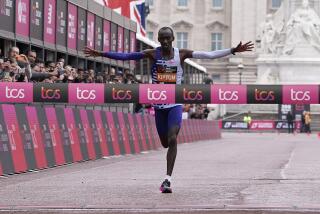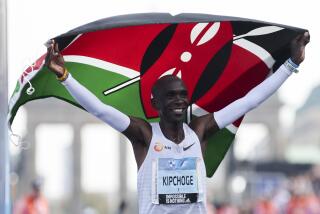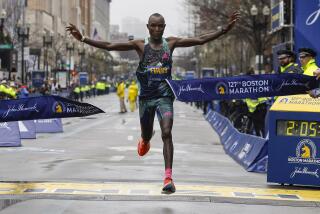There Was No Cop-Out in the 5,000 for Keino
- Share via
By any measure, it was a remarkable achievement. A year later, it would be seen as an Olympic Games preview.
On this weekend in 1967, at The Times-sponsored USA-British Commonwealth track meet at the Coliseum, a Kenyan cop named Kip was a central figure.
On Saturday, Kipchoge Keino, 27, ran the ninth-fastest 1,500 meters of all time, only to finish 30 meters behind American Jim Ryun, who broke a world record that had stood for seven years, running 3:33.1.
On Sunday, 32 years ago today, Keino was entered in the 5,000 meters with world-record holder Ron Clarke of Australia.
Would he have enough left, only a day later, to challenge one of history’s great distance runners?
He had plenty. This time, Keino ran only to win and not to match a world-record pace, never trailing Clarke by more than a few meters.
With 800 meters left, Keino passed Clarke and, with a 59.4-second last lap, easily beat Clarke by 10 meters. The time, 13:36.8, was 20 seconds off Clarke’s world record.
Obvious question afterward: Would Keino run the 1,500 or 5,000 at the 1968 Mexico City Olympics?
“I have not made that decision yet,” he said.
He ran both . . . plus the 10,000 meters.
At Mexico City, he dropped out of the 10,000 with stomach pains, then finished second in the 5,000 final. In the 1,500, he ran the first 800 meters in 1:55.3 and beat Ryun by 12 meters.
Also on this date: In 1914, the Boston Red Sox purchased pitchers Babe Ruth and Ernie Shore from the International League’s Baltimore Orioles for $8,000. . . . In 1966, Jack Nicklaus, 26, won the British Open for the first time with a one-shot win over Doug Sanders and Dave Thomas. On the same day, Fleet Host was the surprise $39.20 winner of Hollywood Park’s Hollywood Derby, favored Exhibitionist finishing fourth.
More to Read
Go beyond the scoreboard
Get the latest on L.A.'s teams in the daily Sports Report newsletter.
You may occasionally receive promotional content from the Los Angeles Times.






